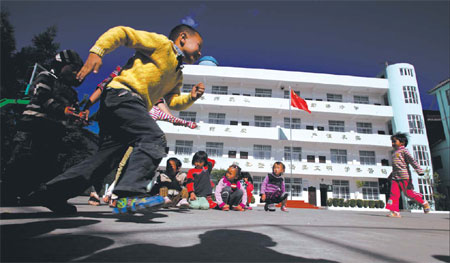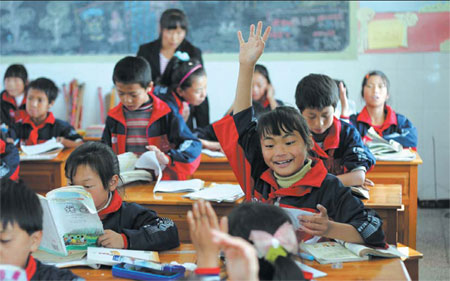School's students border on the exceptional
Updated: 2013-02-26 08:06
By Hu Yongqi, Li Yingqing and Guo Anfei (China Daily)
|
||||||||
|
Students play at Pianma Border Primary School, one of many border schools in Yunnan province that has students from neighboring Myanmar. Photos by Wang Jing / China Daily |
|
Above: A class at Pianma Border School. Left: Young monks take part in an IT class at a middle school in Xishuangbanna, Yunnan, where Chinese students mix with students from across the border. |

Children from various nationalities and ethnic backgrounds find learning is a class act, report Hu Yongqi, Li Yingqing and Guo Anfei in Yunnan.
Twirling a pencil in the fingers of her right hand, Wu Liumei, 13, stopped for a second as she contemplated the equations the math teacher had written on the blackboard, and then continued to take notes.
About 50 students sat in the classroom for sixth graders at Pianma Border School, including many from the Lisu and Nu ethnic groups. Although her clothes were almost identical to those of her peers, Wu's darker skin made her stand out; she is from Myanmar.
Born and raised in a small town 10 kilometers from the Chinese border, Wu has spent seven years studying Chinese and other subjects at Pianma, a small border town in Nujiang Lisu autonomous prefecture in Yunnan province. Sheer hard work enabled Wu to beat her classmates and take first place in the final exams of the semester, much to her teachers' delight.
Wu is the sixth of seven children in her family. Her father works for the local government, a position that not only allows him to earn more than his neighbors but also provides frequent interaction with Chinese businessmen. That interaction made him realize the increasing importance of Mandarin and so he sent one of his elder daughters to study in Pianma. She has now graduated and studies at a college in Kunming, the capital of Yunnan.
Wu said her sister's success encouraged her father to ensure that all of his children learn Chinese. "When my sister graduates from college, she will definitely get a decent, well paid job in my hometown because China is our most-important trading partner," said Wu, who added that obtaining an education in China has become an increasingly popular trend in Myanmar.
Twenty-five children from Myanmar study at Pianma Border School along with their Chinese peers. Yunnan neighbors Laos, Vietnam and Myanmar along its 4,061 km stretch of border. In 2008, the central and the provincial governments invested 200 million yuan ($32 million) to erect new buildings and upgrade the facilities at 28 schools, mostly those for primary students, in 24 border counties.
At Pianma School, one of the beneficiaries of the project, two classroom blocks were rebuilt and dozens of computers were provided for the students. A soccer field will be built on a piece of land that the township government bought for 2.9 million yuan.
"Compared with six years ago, the students now enjoy better equipment and share larger dormitories," said principal Ma Dacai.
Education experts said the project has helped to improve facilities at the schools, raising awareness of education in the far-flung border areas.
Ethnic languages
In 1983, the first five students from Myanmar crossed the border and began the journey to study at Pianma. "At the outset, the Myanmar students came to learn Mandarin and returned home when they finished primary school classes aged 14 or 15 to conduct business with Chinese traders," said Ma.
The expansion of cross-border trade meant that merchants in Myanmar discovered an urgent need for employees who could speak Chinese, said Ma. In addition, the local government in Myanmar required more interpreters for its increasing exchanges with Chinese officials. Those factors saw the number of Myanmese students studying in Pianma triple to 18 in 2009, when the upgrade was completed at Pianma Border School.
In Wu's hometown, the local government doesn't provide free education at the primary level and so parents have to hire teachers for their children, said Ma. Most parents struggle to pay for the education, but wealthier families will often offer to pay for the children from poorer families to study in China, Ma added.
Wu said children in Myanmar not only provide their own lunches, but also bring food for the teacher, just as Chinese students did back in the 1960s. "But in my school, Myanmese students enjoy free education and free lunches as long as they have registered at the residence management bureau in the county seat," added Ma.
Most of the Myanmese students join the classes two or three years later than their Chinese peers because their parents want them to learn their native language first. Last year, one student from Myanmar entered the first grade at the age of 13, six years older than his classmates.
It's difficult to discern any real difference between the Chinese and Myanmese children when they engage in extracurricular activities in the playground. That's because they have the same ethnicity. In both Pianma and Wu's hometown, many residents share the same origins and speak the ethnic Lisu language.
Wu said she and her compatriots were unable to speak Mandarin when they first entered the school and so the teachers instructed them in Lisu.
In Pianma, 90 percent of the 36 teachers are fluent in the ethnic language. Ma said, "Kids are much keener on language acquisition than adults and any slow learners catch up quickly if a teacher gives one-on-one instruction after class."
The situation is similar at other border schools, because many people on both sides of the border originate from the same ethnic groups. In Ruili city, a major trading port with Myanmar in the Dehong Dai and Jingpo autonomous prefecture, there are 1,758 Myanmese students. They study at all levels, ranging from kindergarten to occupational high school, where the students train for their preferred type of work and not further education. The students account for more than 5 percent of the total, according to the Ruili education bureau. However, only 137 Myanmese students have entered middle- or high school and very few enroll at university.
Yunjing village was divided when the permanent border, established in the 1960s, neatly bisected the settlement. At around 7 am, 64 children from the Myanmese part of the village ride their bikes to the Yunjing Border Primary School near downtown Ruili before returning home when classes finish in the afternoon.
"I require all first- and second-grade teachers to master the Dai language. Teachers will speak Mandarin and Dai to the Myanmese students in the first year. After one or two years, the Myanmese kids use Mandarin confidently," said Sun Jialiang, the school principal.
The Myanmese students get along very well with their Chinese peers, said Sun, which helps them to master the new language.
Soldiers help
Border security is a big issue for frontier inspection soldiers, but students are not subject to physical checks and are able to pass through the border entry point simply by sliding their electronic ID cards across a screen.
Liu Shiquan, political advisor to the Pianma Frontier Inspection Station, said the border is officially open from 8 am to 10 pm. However, he ordered his soldiers to start work 60 minutes ahead of schedule to allow the Myanmese children to pass through and get to school on time at 8 am.
Li Xiaolong, a captain at the station, said education is becoming increasingly important to parents. "Several years ago, they would always make excuses, saying that their kids had to help on the farm, otherwise their family wouldn't survive," he said. "But now, parents really want to see their kids get a good education."
Meanwhile, the frontier inspection soldiers have used children as part of their efforts to prevent gambling and drug dealing, said Li.
"Many people in Pianma made their fortunes by trading logs and jade with Myanmar. They would cross the border to gamble in the casinos in Myanmar. Some of them lost all their money. So, how could they raise children and support their families?" he asked. "Frontier soldiers had been looking for a way to stop their behavior. But it was really hard to persuade them to stay away from gambling. Then we turned to their kids, telling them how bad gambling and drugs are. When the students go home, they transmit the anti-gambling message to their parents who are more likely to listen to their children."
Li said his soldiers offered anti-gambling and anti-drugs classes at Pianma Border Primary School every month to improve the stability of the area. In addition, the soldiers donated money to families who couldn't afford to educate their children.
"We want more children to receive a better education and make a difference for their families. In the past 20 years, we have made donations to about 300 students," said Liu.
Lu Xin, China's vice-minister of education, highly evaluated the soldiers' effort to jointly build border schools with the local government on a visit to Yunjing Border Primary School in April 2012. She said the frontier soldiers strengthen the border defenses and their presence has created an environment conducive to the promotion of education.
For their part, the Myanmese students said they have learned a lot at the border schools and are grateful to their teachers.
"One of my dreams is to become Myanmar's ambassador to China. If I were ambassador, I would definitely promote exchanges with China and help more kids to study there," said Wu Liumei.
Contact the writers at huyongqi@chinadaily.com.cn and guoanfei@chinadaily.com.cn
Cui Jia and Yang Wanli contributed to this story.
(China Daily 02/26/2013 page6)

 In Photos: 7.0-magnitude quake hits Sichuan
In Photos: 7.0-magnitude quake hits Sichuan
 Li Na on Time cover, makes influential 100 list
Li Na on Time cover, makes influential 100 list
 FBI releases photos of 2 Boston bombings suspects
FBI releases photos of 2 Boston bombings suspects
 World's wackiest hairstyles
World's wackiest hairstyles
 Sandstorms strike Northwest China
Sandstorms strike Northwest China
 Never-seen photos of Madonna on display
Never-seen photos of Madonna on display
 H7N9 outbreak linked to waterfowl migration
H7N9 outbreak linked to waterfowl migration
 Dozens feared dead in Texas plant blast
Dozens feared dead in Texas plant blast
Most Viewed
Editor's Picks

|

|

|

|

|

|
Today's Top News
Live report: 7.0-magnitude quake hits Sichuan, heavy casualties feared
Boston suspect cornered on boat
Cross-talk artist helps to spread the word
'Green' awareness levels drop in Beijing
Palace Museum spruces up
First couple on Time's list of most influential
H7N9 flu transmission studied
Trading channels 'need to broaden'
US Weekly

|

|









